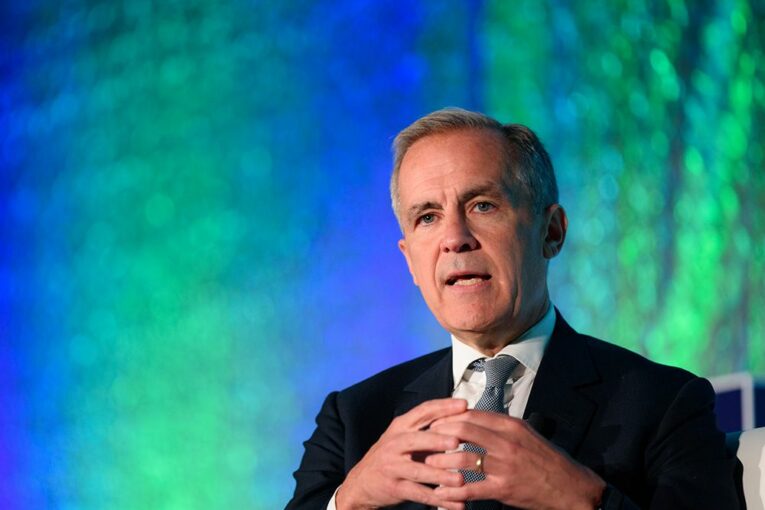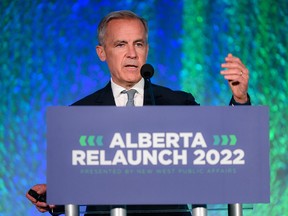
Alberta has transformed its energy sector before and it can do it again as a leader in the global energy transition, according to Mark Carney.
The former governor of the Bank of Canada and the Bank of England said energy market instability amid the Russian invasion of Ukraine positions Alberta to seize market share in a net-zero energy economy.
It’s a crossroads he said has parallels to the oil shock of the early 1970s, a time in which Alberta solidified itself as an oil producer on the world stage.
“History is rhyming,” Carney said during a keynote speech Tuesday at the Alberta Relaunch conference in Calgary, hosted by New West Public Affairs.
“We’re once again in a position where geopolitics are absolutely rupturing global energy markets, and just as then, Alberta can be part of the solution with that, but there’s challenges.
“I would argue those challenges are not as great as the original challenges of turning the oilsands into commercial viability.”
-

‘Vote with their feet’: More people moving to Alberta as economy gains traction
-

Varcoe: A surprise surplus in Alberta hints a bigger bonanza ahead as royalties go ‘through the roof’
Carney discussed the political philosophy of Peter Lougheed, Alberta’s premier who presided over that period of economic reform and growth.
Lougheed focused on energy sovereignty, economic diversification and investing in future generations, including through the Heritage Savings Trust Fund, Carney said.
Those goals were soundly conceived but not always well executed, Carney argued, with short-term spending prioritized over long-term investments.

He said governments should consider those past experiences when deciding how to invest surpluses from resource revenues. Coincidentally, on Tuesday Alberta released its fourth-quarter results for the financial year that ended on March 31, showing a $3.9 billion surplus for the 2021-22 budget year.
“I would suggest the revenue windfalls we’re seeing now after a very difficult time, it may make sense to think with a clearer view of the horizon and the potential horizon, and the heritage responsibilities,” said Carney, who grew up in Edmonton and is currently the vice-chairman at Brookfield Asset Management.
“How are those revenue windfalls going to be spent? … How much is debt paid down? How much is put into the heritage fund itself, and how much goes in-kind into heritage? In other words, through infrastructure, through R&D, through the development of the province for future generations, including for workers.”
Carbon capture, utilization and storage technology will be one key in Alberta’s energy transition, Carney said. He noted there’s a business as well as a moral case for net-zero pursuits, citing research that low-emissions companies trade at a premium.
Carney added government policy on energy should be date-certain, setting concrete goals by specific dates that are “far enough off in the future that you can do something about it, but close enough that you have to.”
When asked about risk of an economic recession in the coming months, Carney said the chance of that happening in the United States is “uncomfortably high.” But he said it will likely be a relatively mild recession, and one which Alberta could insulate itself from.
Alberta may be a province, but it “is in a better position than virtually any…country,” he said. “We have the potential to have the benefit of what’s needed in reworking in the energy system, which is why we need to act with speed so we get the investments.”
Twitter: @jasonfherring
You can read more of the news on source
